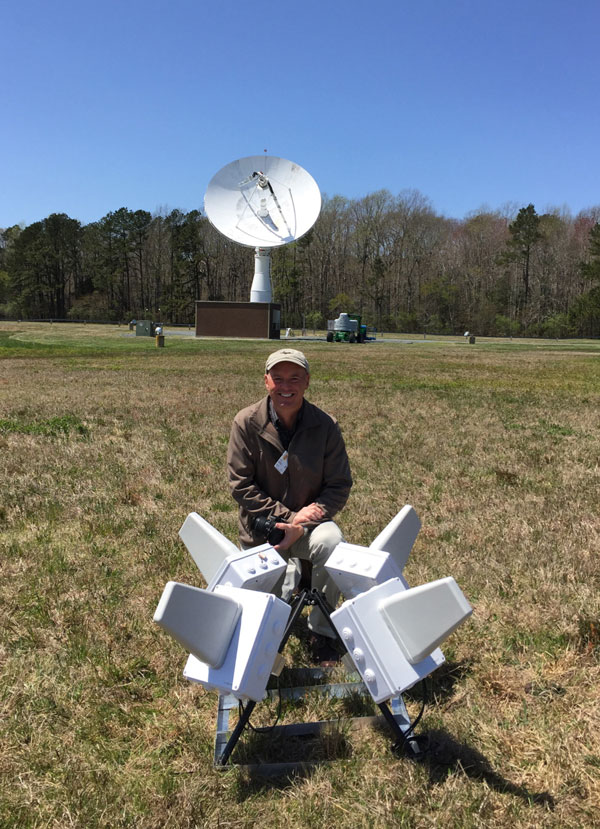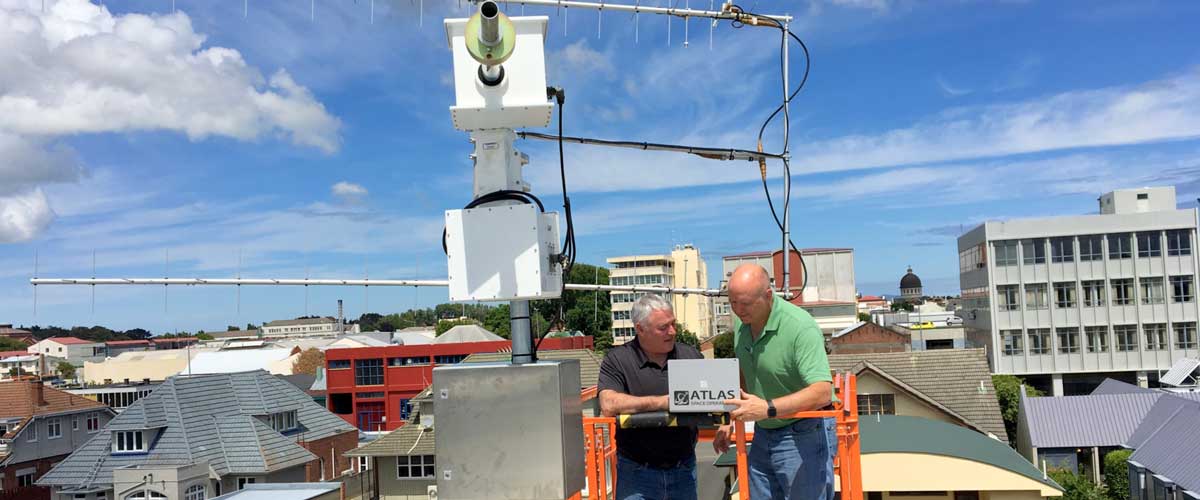
Crain's Detroit Business July 15, 2018 By Tom Henderson
 Mike Carey, a retired brigadier general in the U.S Air Force, was living in Traverse City in March 2017 when he met with the Northern Michigan Angels and then the Front Street Irregulars, a local informal business group, to pitch for funding for Atlas Space Operations Inc., a startup hoping to install smaller, better, cheaper antennas for ground-based communication with satellites.
Mike Carey, a retired brigadier general in the U.S Air Force, was living in Traverse City in March 2017 when he met with the Northern Michigan Angels and then the Front Street Irregulars, a local informal business group, to pitch for funding for Atlas Space Operations Inc., a startup hoping to install smaller, better, cheaper antennas for ground-based communication with satellites.
A native of Michigan who graduated from Gaylord High School, Carey was a much-honored, highly pedigreed Air Force officer.
Posts included director of Space Forces at the Combined Air Operations Center in southwest Asia; commander of the 90th Space Wing at the Warren Air Force Base in Wyoming; deputy director of Command, Control and Nuclear Operations at the Pentagon, where he oversaw the nation’s intercontinental ballistic missiles; and commander of Air Force Global Strike Command at the Warren Air Force Base. In 2009, he was posted to Afghanistan to improve the way satellite communications were used to deploy combat troops.
 Atlas plans on carving out market share from the two industry giants, Kongsberg Satellite Services in Norway and Swedish Space Corp., who dominate the market but rely on the traditional giant, expensive antennas. Atlas buys component parts to build its own much cheaper antennas, some of them even portable, and developed its own proprietary software to collect and analyze data.
Atlas plans on carving out market share from the two industry giants, Kongsberg Satellite Services in Norway and Swedish Space Corp., who dominate the market but rely on the traditional giant, expensive antennas. Atlas buys component parts to build its own much cheaper antennas, some of them even portable, and developed its own proprietary software to collect and analyze data.
As satellites get smaller and smaller, and the companies using them get smaller, too, big cost reductions should translate into market share. At least that’s the plan. A launch scheduled for September from Vandenberg Air Force Base in California will take as many as 90 satellites into space at once for a variety of customers, and each of them will need tracking.
Atlas installs larger antennas, too, but is focusing on what it calls its Links system, an electronically steered array of four small connected antennas that is 28 inches tall, 40 inches in diameter and weighs just 55 pounds. The company sets out four of them over a space about the size of a volleyball court and delivering, the company claims, performance at least equivalent to traditional towering concrete and metal structures aiming their 6.3-meter dishes skyward.
Though he was based in Traverse City, as chief strategy officer for the company, Carey regularly commuted to its headquarters in Encinitas, Calif., and planned on continuing to do so. But that quickly changed. Three days after meeting with the Front Street Irregulars, the group’s founder, Casey Cowell, called him early Sunday morning.
“Casey said, ‘I hope I’m not calling you too early. Your pitch deck sucked, but I want to make you an offer,'” recounted Carey. “‘If you move the company here, I’ll write you a check for $500,000.'”
By “pitch deck,” Cowell was referring to the series of slides Carey showed would-be investors. The money he was offering was from his Traverse City-based Boomerang Catapult LLC, a company investing in startup and early stage companies in northern Michigan. Carey told him he would need to check with Sean McDaniel, the company’s founder and CEO, who had once overseen testing and evaluation for the Air Force Space Command’s $11 billion missile program and in 2015 had spun Atlas o from another company he ran, Assured Space Access Technologies, a company based in Gilbert, Ariz., that provides engineering services to the aerospace industry.
The other two co-founders of Atlas are Mike Rendine, a retired Air Force colonel who co-founded Assured Space Access; and Brad Bode, a veteran of the aerospace industry who oversaw a variety of software and designs to integrate system architecture for satellite command and control. He developed Atlas’ Freedom brand of proprietary software for ground-to-space communications.
“I called Sean and said, ‘What do you think about moving the company to Michigan if we get an investment?'” said Carey. “He was, ‘Dude, I’m from Michigan.'”
The Northern Michigan Angels also joined in the funding round, the group’s first collaboration with Boomerang Catapult. The angels invested more than $250,000, with a record number of members participating. The company eventually raised more than $2 million in the round.
Jim Cantrell is the CEO of Tucson-based Vector Launch Inc., a veteran of the space industry with SpaceX, Elon Musk’s space rocket company, and now head of a startup company building smaller rockets to carry the current and next generation of small mini-satellites into space.
Before raising $50 million for the recent launch of his company, which employs about 130 and is raising another equity round, he served as an adviser to Atlas. “I told him he had a pitch deck that sucked, too,” said Cantrell with a laugh. “But I was convinced of their product.”
Vector Launch is scheduled to have its first orbital launch of a rocket in October, but used Atlas on several suborbital launches. “We use their radio frequency tracking stations to do downrange tracking of our launch vehicles. We view them as really disruptive to the industry. They’re going up against a lot of fixed infrastructure that costs tens of millions of dollars. They can do the job for a tenth of the money, and you’re getting something that works better and is mobile.”
Cowell agrees. “Atlas has disruptive, transformative technology in both the antenna — you can carry it in one hand, it talks to multiple satellites simultaneously, it has a larger aperture so you can talk to satellites longer, with much greater download capacity — and their software. “The number of satellite launches is rising dramatically as the cost of satellites and launches is coming down.
But ground-to-satellite communication hasn’t changed in 30 years. There’s no other contender out there that I could find. It was a no-brainer.”
Barbara Plante is CEO of Mountain View, Calif.-based Boreal Space, which makes the Wayfinder spacecraft that takes small satellites into low-earth orbit and is another Atlas customer.
She said she met Carey two years ago when he was making a pitch at the Silicon Valley Space Center. “I was very impressed with their business model, and I knew I’d be keeping them in mind for future ground-station needs.”
Last year, she used Atlas’ network of ground stations and its proprietary software to provide data on a launch into low-earth orbit for a customer in Singapore.
“Future plans include leveraging Atlas’ integrated ground-station capabilities to support projects that Boreal is working for internet of things connectivity,” she said. “Atlas works hard to bring capable and low-cost data management options to space companies like Boreal Space, helping to level the playing field and enabling us to compete with big aerospace companies.”
“Atlas’ technology disrupts the traditional downlink/data business, and as such they do not need to reside in the traditional space destinations to be successful, and in fact our area may provide an edge in both costs and talent,” said Scott Dennis, a member of the Northern Michigan Angels who himself is a retired Air Force general.
“We at NMA are very excited about their execution and traction to date. We think this can put us on a path of increasing the tech hub in the TC area,” he said. As part of getting the word out that it wants to build an aerospace hub in Traverse City, Atlas sponsored the first annual two-day Michigan Space Forum in June. Jim Cantrell of Vector Launch was the keynote speaker.
Another speaker was Steve Canny of Venture Southland, an economic development organization in New Zealand.
Cowell wrote his check in March 2017. By April, the company had hired its first local employee, Mikel Acasuso, whom Carey had met at TC New Tech, a monthly meetup of area tech folks. Atlas now has 20 employees, 14 of them at its Traverse City headquarters and the rest scattered around the U.S., including two at the NASA Ames Research Center in Mountain View, Calif.
One of the local employees is Hanna Pritchard, who has the title of orbital analyst and is in charge of mastering the calculus that figures out how to track the orbits of numerous satellites as they travel above Earth at different heights and speeds.
A math major at Eastern Michigan University, she was back in her hometown aer graduation but unable to find suitable employment and working part time as a waitress at the local Eagles club. A mutual acquaintance knew Carey was looking for a mathematician and set up a meeting.
“I met her and immediately oered her a job. She’s been fantastic,” he said.
Atlas’ first customer was, thanks to the founders’ extensive contacts, the U.S. government, which awarded the company a contract to install a satellite somewhere in Equatorial Africa by the first of July last year. “That was a crazy timetable. But we just said ‘OK’,” Carey said. The contract didn’t specify where. It ended up being installed in central Ghana, following negotiations with a local tribal chief, and was online on June 28.
The next installation was in New Zealand. The company has done six antenna installations and has 23 more planned, including one in Tahiti under contract by the National Oceanic and Atmospheric Administration.
Other new installations include Hokkaido, Japan, and Mohave, Calif. Its antennas monitor satellites or launch vehicles for 18 customers. The company plans to build a test facility just west of Traverse City in Cedar.
In June, the Georgia Institute of Technology’s Guggenheim School of Aerospace Engineering announced it had begun a research project in partnership with Atlas Space and Lisle, Ill.-based Xenesis Inc. to study how to improve the flow of data from earth-orbiting satellites to ground stations.
The project will miniaturize and test a laser communications transceiver that could dramatically expand the bandwidth available for downlinking information from the growing number of satellites. In January, Atlas and Xenesis formed a partnership to develop the next-generation laser-based optical communications network, designed for high data flow through inexpensive systems, with a goal of eventually being able to transmit and receive petabytes of data. (A petabyte would be equivalent to the storage capacity of over 1,000 typical modern computer hard drives.)
Carey said the company this summer will begin raising a Series A funding round of at least $5 million to accelerate growth and local hiring.
Skip Simms, the managing member of the Ann Arbor-based Michigan Angels, which also met with Carey in March 2017, said his group decided to hold o then on investing, wanting to see Atlas gain traction with paying customers.
“The space industry is going strong. As a global economy we are more dependent than ever on what’s up there,” said Simms. “A lot of people are trying to address the need. As for Atlas, it’s cool they are in Traverse City and Michigan, but we thought they were a little bit early when we met with them. Having said that, we think they are addressing a need, they’re on to the right opportunity.





You must be logged in to post a comment.